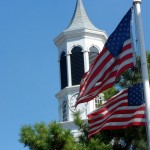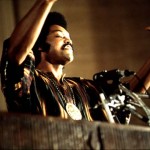Sean Michael Winters corrects against two popular errors. The first is to blame America:
The disposition to blame America first was not restricted to concerns about Central America and today it tends to look as much at our own nation’s past as to any misdeeds perpetrated abroad. The penchant for pulling down heroes of the past, from Thomas Jefferson to Woodrow Wilson, evaluates historical figures by modern-day standards, and ignores the good that was often done by these obviously flawed men, and they were mostly men. Jefferson was not great because he owned slaves, but he was still great despite his ownership of slaves. Wilson was a fierce anti-Catholic bigot, but his vision of a liberal internationalism is still important.
The late Cardinal Francis George once wrote about this tendency to turn American moralism on itself. “If the United States is not the beacon, the universally inclusive ‘city on a hill,’ then it must be the sinkhole, the evil source of global exploitation,” George wrote in his book Inculturation and Ecclesial Communion. “Sometimes this judgment is religiously justified as a prophetic stance. Sometimes, in more sociological terms, disillusion calls itself countercultural. Criticism of institutions and social structures is not, however, countercultural in an anti-authoritarian society such as that of the United States, a country where the mass media lionize dissent. Nor is every social criticism prophetic. The Hebrew prophets, critical though they were, never told their people that they should renounce their past and cease to be Israelites. Rather, the prophets pointed to God and called their people back to their original covenant, to the best in themselves and their history. Modern alienation is not a biblical virtue.”
I fear that the confusion of modern alienation with biblical virtue still haunts some on the religious and political left. I am disturbed by the bizarre denunciation of “cultural appropriation” now found among some leading black scholars, as if cultural appropriation were necessarily a bad thing, and as if it were the principal problem facing black America today.
If the left suffers from holding America ironically to Christian standards of holiness, the right errs on the other side:
Yet, at this moment in our nation’s history, it is the unhealthy faux patriotism of the right that is more concerning, not least because the levers of political power are in the hands of those whose political ideology inclines them to jingoism, xenophobia, nativism and a disparagement of international solidarity. The ideology combines with a psychological trait, the attributes of a bully, to produce a nationalism so insecure it must degrade and diminish others, a toxic mess that is not only concerning, it remains shocking.. . .
But Trump did not just happen. The way was paved by a society that has allowed its educational standards to disintegrate. The way was paved by the endless celebrations of our veterans, who deserve our respect to be sure, but no more so than doctors who tend the sick and the union organizers who defend the workers and the journalists who expose the crooks.
The way was paved by the confusion of bluster with strength that has become the received interpretation of the Reagan years, although the only country we invaded on his watch was Grenada, and when terrorists killed more than 200 American Marines in Beirut, President Ronald Reagan cut and ran.
The way was paved by the military-industrial complex’s decision to place contractors in every congressional district and the cowardice of most in Congress who are unwilling to challenge military spending.
Winters concludes by quoting Bishop Robert McElroy of San Diego on the elements of aspiration that might inform a worthy patriotism. Better might it have been for Winters to quote G. K. Chesterton whom Noah Millman used earlier today to talk about love of country:
On all sides we hear to-day of the love of our country, and yet anyone who has literally such a love must be bewildered at the talk, like a man hearing all men say that the moon shines by day and the sun by night. The conviction must come to him at last that these men do not realize what the word ‘love’ means, that they mean by the love of country, not what a mystic might mean by the love of God, but something of what a child might mean by the love of jam. To one who loves his fatherland, for instance, our boasted indifference to the ethics of a national war is mere mysterious gibberism. It is like telling a man that a boy has committed murder, but that he need not mind because it is only his son. Here clearly the word ‘love’ is used unmeaningly. It is the essence of love to be sensitive, it is a part of its doom; and anyone who objects to the one must certainly get rid of the other. This sensitiveness, rising sometimes to an almost morbid sensitiveness, was the mark of all great lovers like Dante and all great patriots like Chatham. ‘My country, right or wrong,’ is a thing that no patriot would think of saying except in a desperate case. It is like saying, ‘My mother, drunk or sober.’ No doubt if a decent man’s mother took to drink he would share her troubles to the last; but to talk as if he would be in a state of gay indifference as to whether his mother took to drink or not is certainly not the language of men who know the great mystery.
What we really need for the frustration and overthrow of a deaf and raucous Jingoism is a renascence of the love of the native land. When that comes, all shrill cries will cease suddenly. For the first of all the marks of love is seriousness: love will not accept sham bulletins or the empty victory of words. It will always esteem the most candid counsellor the best.












